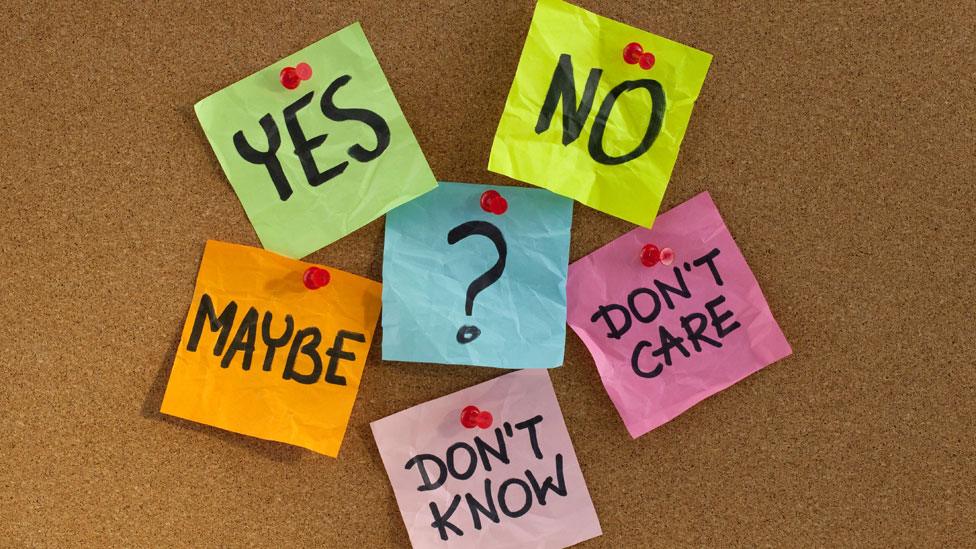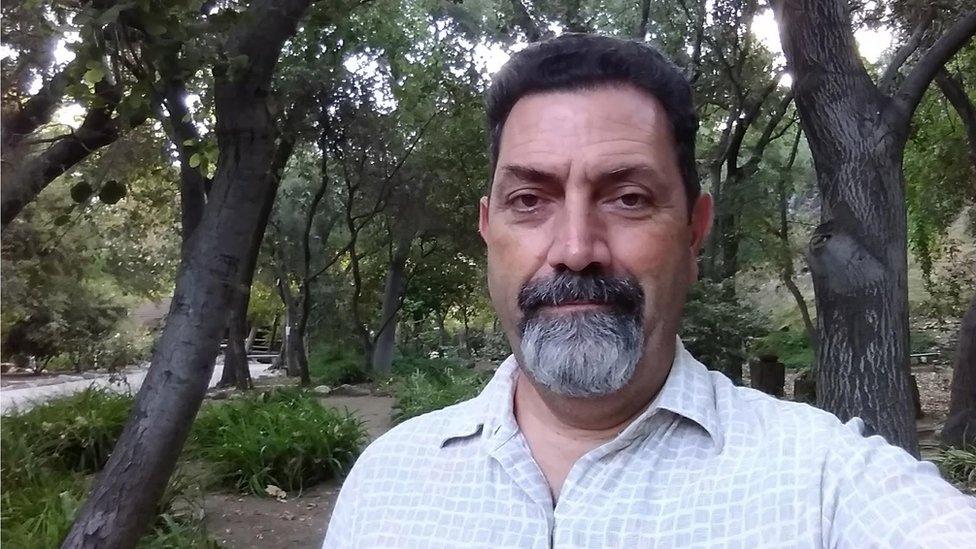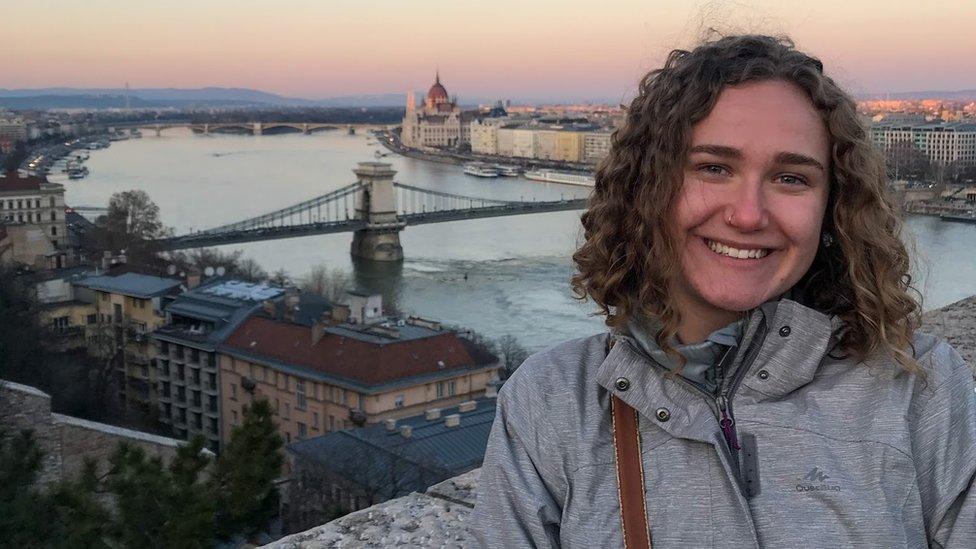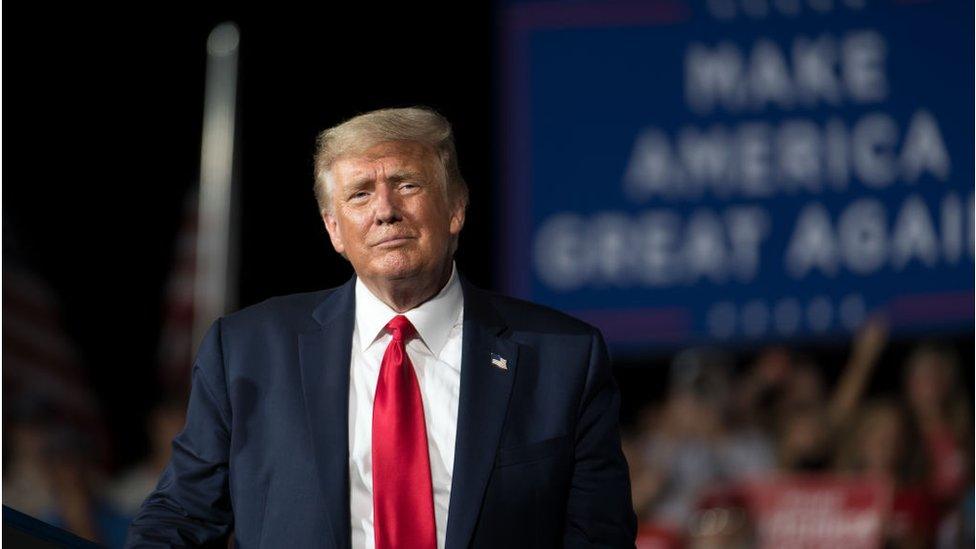US election 2020: The voters who don't like Trump or Biden
- Published

In the final stretch of an already contentious election, Trump and Biden supporters are making a last push to show their backing and convert any undecided voters. But not everyone is thrilled with the choice on offer.
With less than two months to go, both major parties have touted the November contest as "the most important election of our lifetime" and have delivered record-breaking fundraising hauls in recent weeks.
Political observers predict a major surge in overall participation, but many voters are still unsure of whether they will vote for incumbent president Donald Trump, Democratic nominee Joe Biden or anybody at all.
"I feel disillusioned by this election," said Samian Quazi, a 32-year-old psychiatric nurse from Houston. "We don't really have any good choices. Neither candidate is really addressing any issues or offering any hope for this country to really make people's lives better."
Quazi has voted regularly in election years and said he voted for Democratic Party candidates up and down the ballot in both the 2016 presidential election and the 2018 midterm elections, but he has grown cynical after seeing his preferred candidate, the left-wing Bernie Sanders lose the Democratic Party primary election earlier this year.
"It was an example of the powers that be that control media access in this country not wanting to see their economic interest threatened," he said.
"I wonder if America is still trying to be a democracy, when it's really a plutocracy. When it comes to actual economic and structural changes that could possibly threaten their hold on our country, that's a hard no-go and they will push out anybody who materially can change our lives."
Political disengagement in the United States has led to low voter turnout rates relative to the rest of the world, with participation in recent elections hovering in the 50-60% range. Overall voter turnout amongst OECD countries is about 70% and even many developing countries tend to see turnout rates higher than those seen in most US elections.
About 64% voted in the 2008 election between Barack Obama and John McCain, but turnout slipped to a 20-year-low during the 2016 election to only 55%.

Third-party presidential candidates in 2020
Jo Jorgensen, Libertarian Party
Howie Hawkins, Green Party
Kanye West, Birthday Party
Rocky De La Fuente, Alliance and Reform Parties
Don Blankenship, Constitution Party

According to a study released in February by the left-leaning Knight Foundation non-profit, nearly half of eligible voters - or close to 100 million people - consistently sit out elections.
"It's a very large group and it's half the country, so it's a diverse group," said Eitan Hersh, an associate professor of political science at Tufts University and an academic advisor on the Knight Foundation report.
"The lack of engagement has to do with people not feeling connected to the election system and not thinking it matters."
"I would crawl through broken glass to vote for Trump in this election"
Some countries with higher turnout, like Belgium and Chile, have instituted some form of compulsory voting, which has had dramatic impacts on turnout. Others, like Australia and Germany, have courted new voters either through automatic voter registration or aggressive voter registration initiatives.
In the US, however, voting and registering to vote are more of an individual responsibility. Over the past few decades, many states have placed a premium on improving access to the ballot box, including allowing same-day voter registration, keeping polling places open longer and expanding early or mail voting options.
According to Hersh, the outsized importance placed on improving voter access and bringing down other structural barriers to participation do not have a significant impact on voter participation: "If you want a big picture story of why we have low rates of engagement, it's much more about what people care about and what motivates people."
He predicts that, as politics in America becomes more nationalised and partisan, more people may disengage from the political process.
"I'm disappointed in myself" - why Tammy and Jim regret voting for Trump in 2016
"It used to be that your votes for a state legislature were not very highly correlated with your votes for president, because they're different issues," he said. "In this era, a vote for someone running for city council could be a referendum on Trump in people's heads."
Making politics like a fight of good and evil is detached from the reality of running a government, he says. "A lot of people are just not interested in that. Just like in any sport, the more it's focused on a rivalry, the more it is fun for people who like that sport, but the more it seems to other people like a weird domain of life that is not for them."


Hrant Papazian, 52, is one such person.
An Armenian immigrant who grew up in Lebanon during a civil war that spanned three decades, Papazian turned 18 in California and has lived there since, but he never votes.
Voting might make you feel good and powerful, he said, but the status quo will always remain intact: "I don't feel like playing along. I don't believe that we will ever be offered candidates that are interested in societal health. I can't imagine the system producing politicians that I could vote for in good faith."

Hrant Papazian
A middle-school computer science teacher by trade, Papazian knows his approach to voting sounds radical, but he is steadfast in his resistance to a political system he argues is in decline.
"Democracy is supposed to get better, but I think it's the opposite - it gets worse over time. And the bigger the country, the more heterogeneous the country, the less tenable it is. We're breaking up into smaller tribes and that makes us easier to control and makes it easier to keep us on this path that's going downhill slowly.
"The only way for real change is for us to boycott."
Some first-time voters are already disillusioned with the system.
Grace Link, 20, is a college student from the crucial swing state of Wisconsin. She wants to vote in her first ever presidential election, but is unhappy with her options.
"It's very easy to see when money and power within a party come into play to suppress young people," she said. "We're essentially being guilted into voting for Joe Biden and for whomever the Democratic Party chooses when, throughout the primary season, young people were overwhelmingly ignored."

Grace Link
Link argues the nomination of Joe Biden reflects poorly on a system that prioritises the needs of the white upper-class voters over others, including young voters with mounting student loan debt like her.
"A lot of their argument, especially with young people, is that he can be pushed farther left, whereas Trump can't be. The next four years in the short term may be better, but in the long term, there won't be any big changes."
Get in touch
The voices in this story - Grace, Hrant and Samian - are part of the BBC's voter database for the 2020 US election. Are you an American voting (or not voting) in November's election? What issues matter to you and why? The BBC wants to hear your stories and perspectives - join our database by filling out the form below.
In some cases your stories and experiences will be published, displaying your name, age and location as you provide it, unless you state otherwise. Your contact details will never be published. Please ensure you have read the terms and conditions and the privacy policy.
Use this form to get in touch.
If you are reading this page and can't see the form you will need to visit the mobile version of the BBC website to submit your response.
- Published10 September 2020
